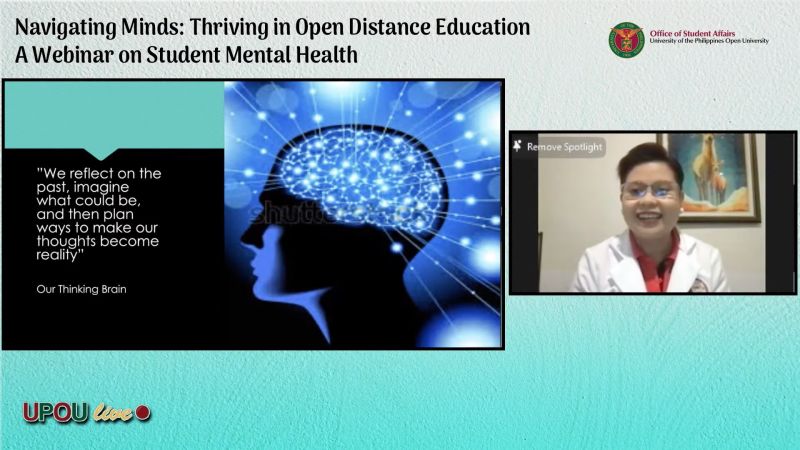
Dr. Jenny Lyn B. Casano served as the resource speaker for the webinar titled “Navigating Minds: Thriving in Open Distance Education – A Webinar on Student Mental Health.”
The University of the Philippines Open University Office of Student Affairs (UPOU OSA) held a webinar titled “Navigating Minds: Thriving in Open Distance Education – A Webinar on Student Mental Health” on 16 October 2023 via Zoom and other UPOU online platforms, in celebration of the National Mental Health Month.
Dr. Jenny Lyn B. Casano, a registered clinical psychologist, registered guidance counselor, and an International Certified Addiction Professional-Treatment (ICAP- Treatment) served as the resource speaker during the event. Dr. Casano highlighted the presence of mental health crises, such as but not limited to disorders and illnesses. She started by introducing the concept of “buying and not buying” thoughts that our brain may be able to process daily, and how crucial the first few thoughts are. She also shared that the brain may interpret and predict events based on our past experiences, therefore influencing our performance for the day’s tasks. She emphasized that we, as individuals, “can always challenge our thoughts and separate our body, our awareness, from [those] thoughts“, empowering individuals to take control of their mental well-being.
Dr. Casano also discussed how one may be diagnosed with a mental health disorder or illness. Diagnosis may be done by a medical professional of an individual’s behavioral or psychological syndrome, which may be in the form of criteria or clusters of signs and symptoms. Some diagnoses, in turn, may result in a cognitive dysfunction that affects a person’s normal day-to-day activities. She cautioned against self-diagnosis and instead advised to consult a medical professional or mental health practitioner to assess one’s condition best and not lead to self-medication.
Just like other illnesses, Dr. Casano also emphasized how crucial the early detection of mental health crises, disabilities, or distress is, as it may help the individual towards self-awareness and access to appropriate help or assistance. She added how routines, such as effective stress management, may also be developed and enhanced for one to be mentally healthy and tough to cope and bounce back from the stresses of life actively. She highlighted the importance of empathic understanding and social connectedness through counseling and psychotherapy, which is truly helpful to people experiencing mental health crises.
The webinar also delved into strategies for coping with mental health challenges. While creating and maintaining a self-image is expected, one must weigh if it is still beneficial. Setting boundaries and advice, such as lowering expectations, asking others to help, taking responsibility for the situation, engaging in problem-solving, maintaining supportive relationships, and strengthening support systems were examples of coping strategies. The importance of role-modeling in the household also plays a crucial role in training children to be empathetic and compassionate individuals.
The webinar also offered valuable insights on combating mental health stigma. Some ways to fight mental health stigma such as talking openly about mental health that encourages safe spaces, educating self and others, being conscious of language, and encouraging equality between physical and mental illness were explained. Lastly, practicing self-care to improve mental health and reduce the risk of illnesses was also shared.
The webinar was hosted by Assistant Professor Roda Tajon, the Office of Student Affairs (OSA) Program Development Associate. The webinar was a testament to the University’s commitment to addressing the mental health needs of its students and promoting a healthy, supportive environment for all. For mental health concerns and counseling, please don’t hesitate to keep in touch with the OSA Counseling and Guidance Program (CGP) via email at [email protected].
Written by Betina Paula Cardenas ♦ Edited by Dr. Myra C. Almodiel and Anna Cañas-Llamas








